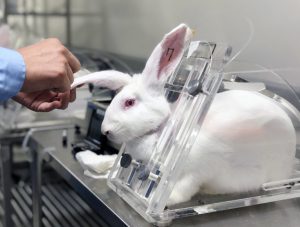The Ethics of Artificial Intelligence (AI)
Artificial Intelligence (AI) has slowly taken a front seat in all consumers’ lives, frequently with stealth. We unknowingly interact with it many times daily, while using our smart phones, our televisions, calling our credit card banks, ordering fast food, or visiting our doctors. The Internet and mobile phones changed the marketplace in the 1980’s, and by extension, AI stands on the precipice of profoundly changing the world in 2025. Let us examine some of the …
May
Radio Interview
As part of her monthly interview series, “Bioethics Briefing” on Spirit Radio’s ‘Spirit Mornings’ show, NCER Board President, Carol Szczepaniak will be speaking on the White Coat Waste project related to animal testing.
I guarantee you will learn new and important information about the mad science that is not only cruel but costing our government billions of dollars. What can we do about it? Listen in starting at 7:40 am Friday, February 7th …
Feb
Year 2024 in Review
Have you noticed and felt a shift in 2024? I hope you agree that this past year we have witnessed Pro-Life voices becoming more brave and strong than ever before. The territories won back are strategic and vital. Our numbers have grown because people sense urgency and momentum. Pro-Life encompasses every issue where the very dignity of human life is challenged. This includes abortion, elder abuse, the transgender agenda, assisted suicide, heritable gene editing, …
Dec
Nano Technology and the Harm It Poses
The term Nanotechnology is all over the news these days, whether it be in reference to medicine or technology. Join us in taking a brief yet thorough dive into what it is, what its applications are across cutting edge fields of science, and how it affects your health.
The term Nano reflects size, specifically 10 to the -9 power. It describes components the size of atoms, and particles so infinitesimal that there are 25,400,000 nano…
Food Safety – The Horse is Out of the Barn . . .
Gene Modification in Produce
Food has been genetically modified since the 1990’s, with tomatoes being the first brought to market. Changes were made within the DNA of the tomatoes causing them to grow faster, larger, and be resistant to pests. Using CRISPR gene editing techniques, we now genetically modify plants and animals using DNA from other species. For example, bacteria DNA is used to modify potatoes, cattle DNA is used to modify salmon, even …
Jul
Alabama IVF Court Case
In 2019, Alabama voters approved a state constitutional amendment which affirmed the sanctity and rights of unborn children, leading to a near total ban on abortions (unborn, in utero).
In the 2022 Dobbs v Jackson decision, the US Supreme Court ruled that states have a legitimate interest in the preservation and protection of prenatal life at all stages of development. In February 2024, Alabama Supreme Court stated that the “wrongful death of a minor act” …
Medical At Home Abortion
The overturning of Roe v. Wade now allows states to set their own policies on abortion, and this dramatically changed the landscape of the abortion industry.
For example, in 2023, 63% of abortions in the US were now medication abortions, not surgical.  Mifepristone and Misoprostol (approved in 2000) are the two abortion medications promoted by the FDA to be used up to the first 10 weeks of pregnancy. However, on average these drugs are used …
Mifepristone and Misoprostol (approved in 2000) are the two abortion medications promoted by the FDA to be used up to the first 10 weeks of pregnancy. However, on average these drugs are used …
NCER 2023 Holiday Greetings
Esteemed NCER Supporter,
When people think of worthy pro-life causes, on the top of the list is 1) faithful sidewalk counseling and prayer, 2) supporting crisis pregnancy centers, 3) caring for the practical needs of pregnant women in crisis, and 4) healing for those who have been traumatized by abortion. But being pro-life is not just about abortion.
People infrequently think of the enormous impact that anti-life practices within medical research and healthcare have. …
Dec
The World’s First Synthetic Human Embryo: No need for sperm, eggs, and fertilization
Worldwide, the prevalence of miscarriage is extremely high, yearly reported at 23 million. Of the average 6 million pregnancies in the United States each year, 16% end in miscarriage. The fetus is most vulnerable within the first trimester, with the majority of losses occurring between week 6-8, possibly resulting from genetic or environmental factors. However, little to no research has yet been conducted on miscarriages during this time period due to lack of access. Human …
Oct
“Nebraska Physicians are Playing ‘Fast and Loose’ with ‘Dead Donor’ Organ Harvesting Laws”
Approximately 42,000 organ transplantations occurred in the United States last year, the highest amount ever. However, over 100,000 people are on the organ transplant waiting list at any given time. In a bid to close the large gap between donors and those waiting, UNMC in Omaha, NE published a new research protocol specifically for heart donor/transplantation. Normothermic Regional Perfusion for Resuscitation of Hearts from Donation After Circulatory Death (NRP-cDCD) refers to a technique whereby a …
Jun







